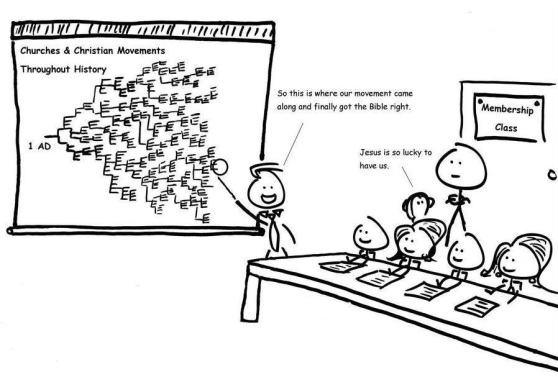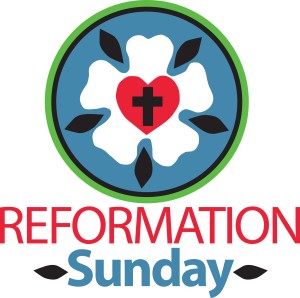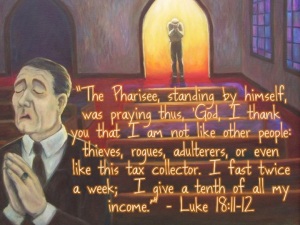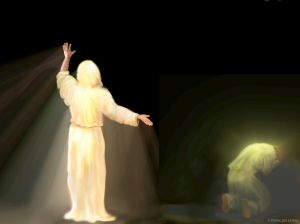“Christ Alone”
Galatians 2:15-21
June 16, 2013, First Presbyterian Church of Jesup
 As a Presbyterian pastor, some people find it strange that I do not personally have strong roots in the Presbyterian Church. When searching for a church, my family historically has picked churches based on the community found within the church. The church I’ve spent most of my life in, First Presbyterian Church of Maumee, was chosen by my parents because of the children’s programs it provided, as well as fellowship for my parents. I grew up in and into the Presbyterian Church. The Presbyterian tradition, confessions, customs, and processes shaped how I experience God and specifically, God’s call for my ministry. But here’s something shocking, I do not believe that we as Presbyterians have everything figured out. And here’s something even more shocking, I think that’s okay.
As a Presbyterian pastor, some people find it strange that I do not personally have strong roots in the Presbyterian Church. When searching for a church, my family historically has picked churches based on the community found within the church. The church I’ve spent most of my life in, First Presbyterian Church of Maumee, was chosen by my parents because of the children’s programs it provided, as well as fellowship for my parents. I grew up in and into the Presbyterian Church. The Presbyterian tradition, confessions, customs, and processes shaped how I experience God and specifically, God’s call for my ministry. But here’s something shocking, I do not believe that we as Presbyterians have everything figured out. And here’s something even more shocking, I think that’s okay.
 There’s a book that came out January of 2011 called “What’s the Least I Can Believe and Still Be a Christian.” I like the concept of this book, a getting back to the basics of our faith.
There’s a book that came out January of 2011 called “What’s the Least I Can Believe and Still Be a Christian.” I like the concept of this book, a getting back to the basics of our faith.
 It is certainly not a new idea. When Martin Luther wrote up his famous 95 theses his main desire was to take the Christian faith back to the beginning, back to the core elemental beliefs that makes people Christians.
It is certainly not a new idea. When Martin Luther wrote up his famous 95 theses his main desire was to take the Christian faith back to the beginning, back to the core elemental beliefs that makes people Christians.
 If we hold to the Presbyterian tenant of being “reformed and always being reformed according to the word of God,” these institution shaking ideas of going back to the basics should excite us. But of course there are things that we very much enjoy about our tradition. We like the stability of history, the comfort of the way we’ve always done things. There is nothing inherently wrong in any of these things. What becomes troublesome however is when we believe that we’ve got it all figured out and that these man made rules of how to go about being faithful are the one and only way.
If we hold to the Presbyterian tenant of being “reformed and always being reformed according to the word of God,” these institution shaking ideas of going back to the basics should excite us. But of course there are things that we very much enjoy about our tradition. We like the stability of history, the comfort of the way we’ve always done things. There is nothing inherently wrong in any of these things. What becomes troublesome however is when we believe that we’ve got it all figured out and that these man made rules of how to go about being faithful are the one and only way.
 Sometimes when I read Paul’s letters to all of those early Christian communities it sounds like he is simply giving them a talking to for a lot of things we don’t even do anymore. It’s tempting to read this simply as Paul scolding the Jews for their desire to maintain salvific legalism even after Jesus’ death and resurrection superseded the old law. Yes, that is in there, and I don’t know about you, but I’m under no temptation to return to all of the laws given in Leviticus. I have no desire to give up shellfish or cheeseburgers or try to figure out what fabrics I’m allowed to wear. And I’m not tempted to believe that any one of these practices will bring me closer to God, let alone will bring me salvation.
Sometimes when I read Paul’s letters to all of those early Christian communities it sounds like he is simply giving them a talking to for a lot of things we don’t even do anymore. It’s tempting to read this simply as Paul scolding the Jews for their desire to maintain salvific legalism even after Jesus’ death and resurrection superseded the old law. Yes, that is in there, and I don’t know about you, but I’m under no temptation to return to all of the laws given in Leviticus. I have no desire to give up shellfish or cheeseburgers or try to figure out what fabrics I’m allowed to wear. And I’m not tempted to believe that any one of these practices will bring me closer to God, let alone will bring me salvation.
 But that’s not the only legalism we’re dealing with. There are so many theological conventions, liturgical rituals, and sociological assertions that have developed over years and years of Christian faith, reformations, and denominational splits. In this cartoon it shows a membership class and the presenter has a chart that says “Churches and Christian Movements Throughout History.” The presenter says, “So this is where our movement came along and finally got the Bible right.” And one of the people in the class says, “Jesus is so lucky to have us.” While I value the history, wisdom, and community found in our denominational structure, the splintering of denominations throughout time points to the very religiosity that Paul railed against, saying, “But if I build up again the very things that I once tore down, then I demonstrate that I am a transgressor. For through the law I died to the law, so that I might live to God.” (Galatians 2:18-19) Paul tells us that we are justified by faith in Jesus Christ. Faith in Jesus Christ. Period. The end.
But that’s not the only legalism we’re dealing with. There are so many theological conventions, liturgical rituals, and sociological assertions that have developed over years and years of Christian faith, reformations, and denominational splits. In this cartoon it shows a membership class and the presenter has a chart that says “Churches and Christian Movements Throughout History.” The presenter says, “So this is where our movement came along and finally got the Bible right.” And one of the people in the class says, “Jesus is so lucky to have us.” While I value the history, wisdom, and community found in our denominational structure, the splintering of denominations throughout time points to the very religiosity that Paul railed against, saying, “But if I build up again the very things that I once tore down, then I demonstrate that I am a transgressor. For through the law I died to the law, so that I might live to God.” (Galatians 2:18-19) Paul tells us that we are justified by faith in Jesus Christ. Faith in Jesus Christ. Period. The end.
Presbyterian pastor Heidi Husted Armstrong writes, “Salvation is never a matter of Jesus and something else: not Jesus and certain cultural practices; not Jesus and a certain spiritual practice or theological perspective; not Jesus and a particular income level; not Jesus and a specific denominational brand; not Jesus and one political party; not Jesus and being good enough. Just Jesus. If anyone or anything else can be said to justify the sinner, the gospel is derailed, and, in the words of Paul’s devastatingly abrupt conclusion, “Christ died for nothing” (v.21)”[1] The community of Galatia used to depend on the law to bring them to salvation. If they just followed all the rules they would be saved from their sinfulness. Jesus came about to bring another way, a new path to salvation.
 Jesus is a burner of old bridges. Like Indiana Jones, Lord of the Rings, Shrek, and so many action movies where the pathway crumbles behind the person who steps on it, as we follow Jesus, the old pathways fall away. Any way we try to access salvation apart from Jesus is like Wile E. Coyote trying to run on air. We are not left midair. Christ makes a new pathway, one designed for the forgiveness of all.
Jesus is a burner of old bridges. Like Indiana Jones, Lord of the Rings, Shrek, and so many action movies where the pathway crumbles behind the person who steps on it, as we follow Jesus, the old pathways fall away. Any way we try to access salvation apart from Jesus is like Wile E. Coyote trying to run on air. We are not left midair. Christ makes a new pathway, one designed for the forgiveness of all.
Emory professor, Wendy Farley wrote, “If we begin with faith, we can inhabit our traditions more lightly. We can enjoy the formation our particular community provides without insisting that it is the only way. Our faith can allow us to be nourished by tradition without assuming that those who practice differently have not knowledge of God. Faith gives us the confidence to honor our heritage, while recognizing the new things God is doing in other people’s lives.” [2]
I love the idea of inhabiting our traditions lightly. I think it helps to place the emphasis on our elemental faith in Jesus Christ, while allowing our traditions to compliment and support our faith, without overshadowing it.
 This passage also brings up a beautiful image, allowing Christ to live in us. We affirm that Christ came for all, and so might Christ live within all for whom He died, that’s to say, everyone.
This passage also brings up a beautiful image, allowing Christ to live in us. We affirm that Christ came for all, and so might Christ live within all for whom He died, that’s to say, everyone.
Farley continues, “Through death and resurrection Christ comes to dwell in the human heart and to produce a community based not on social distinctions but on love. This community should reflect our common human situation as recipients of grace and bearers of the Divine. The Divine dwells in Jews and Gentiles, slaves and free, men and women. This indwelling reveals the essential intimacy that exists between humanity and its creator, an intimacy that even we cannot neutralize, because it does not depend on us but on the graciousness of the living God. Faith allows the indwelling of Christ to become more transparent. Free from the logic of a social world built on the oppression of others, we are able to recognize others as bearers of the Divine. Faith is the sire of unity, where God’s desire for us and our own desire are woven together.” [3]
When we acknowledge one another as bearers of the Divine we are compelled to treat each other differently, to open up our eyes a bit wider to recognize Christ in our midst. And once we do recognize Christ in the other, we must make room for all to experience Christ’s great love.
 Making room for all at the table of Christ may mean we get a little scrunched. We belong to a faith that affirms, “the first shall be last and the last shall be first.” We may approach the table as the last and then become the first, but what will we do from that position? At a certain point we need to cede our place as “first,” in order to allow others to come close.
Making room for all at the table of Christ may mean we get a little scrunched. We belong to a faith that affirms, “the first shall be last and the last shall be first.” We may approach the table as the last and then become the first, but what will we do from that position? At a certain point we need to cede our place as “first,” in order to allow others to come close.
This was also a concern of the Jews in Galatia. The first line of this passage could probably even be read with a bit of sarcastic bite: We ourselves are Jews by birth and not Gentile sinners.” (Galatians 2:15) The Galatians were concerned that if even Gentiles could be a part of this new covenant, could access salvation, that all of their law-abiding had been for nothing.
 Why should they get to be a part of things when the Jews had done the hard work of establishing the community? You see, the idea of equality in the eyes of God is not so appealing when you think you’ve got the upper hand or the moral high ground. It’s tempting to think, what’s the point? The point is such equality expands the Kingdom of God. The second you perceive yourself as more worthy of salvation because of your great life or your good works you are missing the point. Your salvation comes not in spite of but because of your inadequacy. All are justified by faith in Christ. All of us, all of you, all of them, whoever the “them” is in your life. Those “others,” are also bearers of the divine image. They are also beneficiaries of grace.
Why should they get to be a part of things when the Jews had done the hard work of establishing the community? You see, the idea of equality in the eyes of God is not so appealing when you think you’ve got the upper hand or the moral high ground. It’s tempting to think, what’s the point? The point is such equality expands the Kingdom of God. The second you perceive yourself as more worthy of salvation because of your great life or your good works you are missing the point. Your salvation comes not in spite of but because of your inadequacy. All are justified by faith in Christ. All of us, all of you, all of them, whoever the “them” is in your life. Those “others,” are also bearers of the divine image. They are also beneficiaries of grace.
 In the time Paul wrote his letter to the community at Galatia the observant Jews would avoid eating with Gentiles, not because of any specific law, but because it would help to maintain purity of their faith. After observing the many dishes required to maintain a kosher kitchen I would imagine part of this avoidance was probably simply because it was easier. Christians who had been Jewish since birth and still desired to maintain these practices had a hard time sharing a table with Gentile Christians. It was difficult to bridge the difference between the old law and the new, and harder still to welcome others on equal standing to a table where they would always seem “the other.”[4]
In the time Paul wrote his letter to the community at Galatia the observant Jews would avoid eating with Gentiles, not because of any specific law, but because it would help to maintain purity of their faith. After observing the many dishes required to maintain a kosher kitchen I would imagine part of this avoidance was probably simply because it was easier. Christians who had been Jewish since birth and still desired to maintain these practices had a hard time sharing a table with Gentile Christians. It was difficult to bridge the difference between the old law and the new, and harder still to welcome others on equal standing to a table where they would always seem “the other.”[4]
 It can be tricky and strange to explain to people in other denominations why we do the things we do, especially when many of our practices are based on tradition or what we’ve found works best for us. What is important is to make sure people know that these practices are not what brings salvation, Christ is. We too are tasked with welcoming these “others” to the table.
It can be tricky and strange to explain to people in other denominations why we do the things we do, especially when many of our practices are based on tradition or what we’ve found works best for us. What is important is to make sure people know that these practices are not what brings salvation, Christ is. We too are tasked with welcoming these “others” to the table.
 We approach the table and the font not because we’ve got it all figured out, but because we are so in need of God’s redemption. The sacraments are not about getting right with God, they’re about getting honest with God. They’re about being vulnerable. They’re about showing up. And since we are all sinners, we all approach the table at an equal footing.
We approach the table and the font not because we’ve got it all figured out, but because we are so in need of God’s redemption. The sacraments are not about getting right with God, they’re about getting honest with God. They’re about being vulnerable. They’re about showing up. And since we are all sinners, we all approach the table at an equal footing.
God through the Holy Spirit makes us able to receive the waters of baptism. God through the Holy Spirit turns bread and juice into a life-giving feast. Christ’s presence is forever renewed in our midst when we acknowledge Him, seek Him out, and put our faith in His redemptive power.
May you approach the table today seeking Christ’s redemptive power for you and for all, even those you never might’ve thought we’re invited. Amen.
[1] Heidi Husted Armstrong, Feasting on the Word: Year C, Volume 3
[2] Wendy Farley, Feasting on the Word: Year C, Volume 3
[3] Wendy Farley, Feasting on the Word: Year C, Volume 3
[4] Gregory H. Ledbetter, Feasting on the Word: Year C, Volume 3
 oday is Reformation Sunday, a day that marks the beginning of the Protestant Church as we know it today. It’s a day for celebrating how far we’ve come as a church. Our affirmation of the priesthood of all believers: which means all of us are called to read and interpret scripture, minister to the community, and have a personal relationship with Jesus Christ. The ways that over the generations we continue to be reformed and always being reformed according to the word of God, a principle that has motivated believers throughout the year to stand up for justice for the enslaved, equality of all of God’s created people, and expand the pulpit to women and minorities. So, let’s just pat ourselves on the back! We’re so righteous, so much better than everybody else!
oday is Reformation Sunday, a day that marks the beginning of the Protestant Church as we know it today. It’s a day for celebrating how far we’ve come as a church. Our affirmation of the priesthood of all believers: which means all of us are called to read and interpret scripture, minister to the community, and have a personal relationship with Jesus Christ. The ways that over the generations we continue to be reformed and always being reformed according to the word of God, a principle that has motivated believers throughout the year to stand up for justice for the enslaved, equality of all of God’s created people, and expand the pulpit to women and minorities. So, let’s just pat ourselves on the back! We’re so righteous, so much better than everybody else! Our Gospel lesson gives us a rather confrontational passage for this Reformation Sunday. One that shows someone so pleased by their righteousness, a Pharisee. Verses 11-12 tells us, “The Pharisee, standing by himself, was praying thus, ‘God, I thank you that I am not like other people: thieves, rogues, adulterers, or even like this tax collector. I fast twice a week; I give a tenth of all my income.’”
Our Gospel lesson gives us a rather confrontational passage for this Reformation Sunday. One that shows someone so pleased by their righteousness, a Pharisee. Verses 11-12 tells us, “The Pharisee, standing by himself, was praying thus, ‘God, I thank you that I am not like other people: thieves, rogues, adulterers, or even like this tax collector. I fast twice a week; I give a tenth of all my income.’” It’s an uncomfortable comparison to put side by side with a Pharisee. In Luke 7:29-30 we are told, that upon hearing of Jesus’ miracles, “All the people who heard this, including the tax collectors, acknowledged the justice of God, because they had been baptized with John’s baptism. But by refusing to be baptized by him, the Pharisees and the lawyers rejected God’s purpose for themselves.”
It’s an uncomfortable comparison to put side by side with a Pharisee. In Luke 7:29-30 we are told, that upon hearing of Jesus’ miracles, “All the people who heard this, including the tax collectors, acknowledged the justice of God, because they had been baptized with John’s baptism. But by refusing to be baptized by him, the Pharisees and the lawyers rejected God’s purpose for themselves.” This tax collector doesn’t try to defend himself when being bad-mouthed by the Pharisee. He wasn’t working on a list of his good deeds or his exceptionalism, rather he defers to God’s great power. In verse 13 we read, “But the tax collector, standing far off, would not even look up to heaven, but was beating his breast and saying, ‘God, be merciful to me, a sinner!’”
This tax collector doesn’t try to defend himself when being bad-mouthed by the Pharisee. He wasn’t working on a list of his good deeds or his exceptionalism, rather he defers to God’s great power. In verse 13 we read, “But the tax collector, standing far off, would not even look up to heaven, but was beating his breast and saying, ‘God, be merciful to me, a sinner!’” In verse 14 Jesus tells the assembled crowd, “I tell you, [the tax collector] went down to his home justified rather than the [Pharisee]; for all who exalt themselves will be humbled, but all who humble themselves will be exalted.”
In verse 14 Jesus tells the assembled crowd, “I tell you, [the tax collector] went down to his home justified rather than the [Pharisee]; for all who exalt themselves will be humbled, but all who humble themselves will be exalted.”












